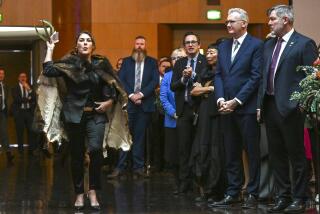Bounty Kin Seek to Keep Self Rule : South Pacific: The people of Norfolk Island say Australia is requiring them to obey more and more federal laws. To fight back, they’ve petitioned the U.N. for the right to govern themselves.
- Share via
NORFOLK ISLAND, South Pacific — Discontent is stirring among the Norfolkers, descendants of convicts and HMS Bounty mutineers who only reluctantly tolerate Australian rule over their isolated speck of land.
“The people of Norfolk Island . . . have never been accorded the right of referendum to decide their destiny,” Norfolk legislator Ric Robinson wrote in a 26-page letter to the U.N. secretary-general, Boutros Boutros-Ghali.
Robinson and other islanders fear Australia is trying to erode Norfolk’s home rule by requiring it to obey more and more federal laws. They want a U.N.-supervised vote to verify their status.
Few of the 1,700 Norfolkers seem to want either complete independence or incorporation with Australia. If there is consensus, it is for self-government, with Australia handling defense and foreign relations.
The very idea of discontent seems absurd on a 5-by-3-mile dab of paradise 930 miles east of Australia, blessed with sparkling beaches, a mild climate, imposing cliffs and the famous, towering Norfolk Pines.
Tourism has brought general prosperity. Life is simple and crime virtually unknown. Cows have the right of way over cars on the road.
But the island’s history is written in rebellion and blood.
England turned Norfolk into a branch of its Australian penal-colony experiment, sending prisoners here from 1788 to 1814, but then evacuating it because the colony was too costly and remote.
In 1825, Norfolk Island was revived as a punishment station, the end of the line for up to 2,000 incorrigible felons and Irish rebels whose spirits were broken with floggings, hard labor and prolonged isolation in silent, blacked-out cells.
“My object was to hold out that settlement as a place of the extremest punishment, short of death,” Gov. Ralph Darling of New South Wales proclaimed in 1827.
He succeeded brilliantly. After a prison rebellion failed in 1834, a priest sent to comfort the convicts reported: “Those who were to live wept bitterly, whilst those doomed to die without exception dropped on their knees, and with dry eyes, thanked God that they were to be delivered from such a place.”
Norfolk’s notoriety contributed to revulsion in England about the practice of sending prisoners to Australia, and the punishment station was shut down in 1854. Now, the ruins of the prison settlement are a tourist attraction.
In 1856, British authorities transferred 194 Pitcairn Island families, most of them descendants of Bounty mutineers, to Norfolk.
Queen Victoria declared the island a “separate and distinct settlement” that year and Norfolkers governed themselves until 1896, when New South Wales took control. Australia’s federal government now has the last word on Norfolk affairs, but the island has its own Legislature and courts.
More than 1,000 of today’s 1,700 islanders are descended from Fletcher Christian’s Bounty mutineers and the Tahitian wives they took. Pitcairn names still dominate the local telephone book: 40 Christians, 28 Quintals, 17 named Adams, eight McCoys, seven Smiths.
Norfolk Island was uninhabited when Capt. James Cook discovered it in 1774, so the current Norfolkers proudly claim to be the indigenous people. They speak English in public, but among themselves use “Norfolk,” a blend of old English and Polynesian words found only on Norfolk and Pitcairn.
Robinson said Boutros-Ghali had not replied to his letter, but “I did get a nice reply from the U.N. Working Group on Indigenous Peoples inviting me to a conference in Geneva at the end of July.”
Norfolkers pay no taxes to Australia and get no general revenues from it. They raise most of the island’s annual budget, equivalent to about $5 million, through local taxes, predominantly on activities connected to tourism.
For decades, Norfolkers have argued for a return of complete self-government.
“Once a people has had self-government, they never forget that they did and the urge is to have it back again,” said novelist Colleen McCullough, Robinson’s wife.
A report in 1978 by the private U.N. Assn. of Australia said it was “a tribute to, among other things, the islanders’ general temperament of civilized tolerance and introspective humility, nurtured by their isolation, that they have endured this state of affairs so quietly.”
In a non-binding referendum three years ago, 82% of Norfolk voters rejected union with Australia.
Robinson, who as deputy president of the Legislative Assembly also serves as minister of commerce and the environment, supports home rule in all domestic matters. He suspects Australia wants to incorporate Norfolk into the federal system in order to assure access to natural gas deposits discovered in 1975 about 190 miles south of the island.
David Buffett, president of the Legislative Assembly, and John Brown, the leader of government, share Robinson’s views on home rule.
“If they stuck to the original idea, that would be fine: all the powers except for foreign affairs, defense and perhaps coinage,” Robinson said. “That would suit us down to the ground.”
Then, he said, Australia “would be a friend and ally instead of this colonial overlord bashing us about the ears when we don’t do things that satisfy them.”
More to Read
Sign up for Essential California
The most important California stories and recommendations in your inbox every morning.
You may occasionally receive promotional content from the Los Angeles Times.













